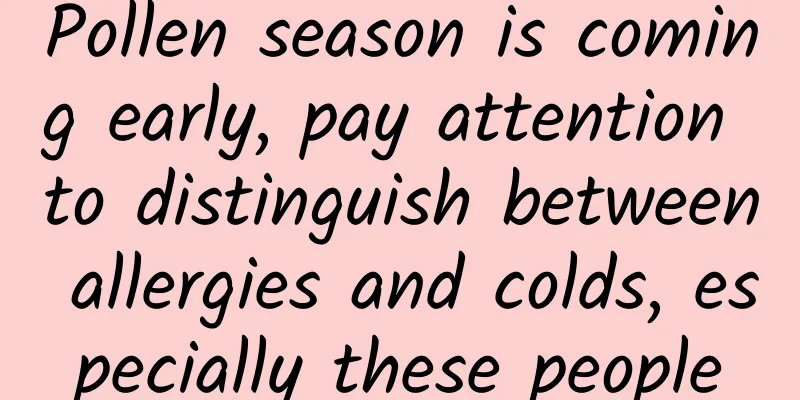Pollen season is coming early, pay attention to distinguish between allergies and colds, especially these people

|
Review expert: Peng Guoqiu, deputy chief physician of the Fourth Medical Center of the General Hospital of the Chinese People's Liberation Army Spring is here, flowers are blooming, grass is sprouting, and everything is coming back to life. However, for people with allergies, they have to experience the "spring-only troubles" of running tears, redness, swelling, and itching of the skin. Why are allergies more common in spring? What are the differences between allergies and colds? And how can we deal with them? 0 1 Reasons for spring allergies Spring is the peak season for plant pollination, and the concentration of pollen in the air is high. In addition, the air is dry and windy in spring, which accelerates the spread of pollen and catkins, and carries dust, pollutants, etc., aggravating respiratory irritation. The temperature fluctuates greatly in spring, and the alternation of cold and hot can easily lead to a decrease in the skin barrier function and induce allergic reactions. However, not all pollens cause allergies. The real "culprit" that causes allergic reactions is wind-borne pollen. Pollen can be divided into wind-pollinated pollen and insect-pollinated pollen. Insect-pollinated pollen refers to pollen spread by insects (such as bees and butterflies). These plants usually have bright flowers and fragrant smells. The pollen particles are large and sticky, and are not easily blown away by the wind. The spread range is limited. Common plants include peach blossoms, apricot blossoms, pear blossoms, rape blossoms, etc. Wind-pollinated pollen relies on wind to spread pollen, mostly from trees or herbs. Its flowers are small and dense, and the pollen particles are small, light, and large in number, and can be spread hundreds of kilometers away by the wind. For example, juniper, a common greening tree species in the north, produces a large amount of pollen from its male plants in spring, which has become the "culprit" of the high incidence of allergies in Beijing and other places. Willow and poplar catkins are the "accomplices" of wind-borne pollen. They are not allergenic themselves, but they carry allergens such as pollen and dust while floating in the air, which can easily cause respiratory discomfort and skin allergies. In addition, relevant studies have shown that global warming has led to the extension of plant flowering periods and increased pollen concentrations, with the pollen season extending by more than 20 days in the past 30 years. On March 16, tourists took a boat tour to enjoy the flowers at the Summer Palace in Beijing (Photo source: Xinhua News Agency) 02 How to distinguish between allergies and colds In addition to causing symptoms such as skin itching and urticaria, constant sneezing, runny nose and tears, coughing and wheezing... These symptoms of allergies are somewhat similar to those of colds. How can we distinguish them? Although the symptoms are similar, there are essential differences between the two: Symptoms of pollen allergy are concentrated in the nose, eyes, skin and respiratory tract, with normal body temperature, no muscle aches or fatigue, strong seasonality and recurring, lasting at least 3 weeks, aggravated on sunny and windy days, and relieved on rainy days. Colds are accompanied by headaches, fever, muscle aches and other symptoms, are non-seasonal, more common in winter and during season changes, and have a shorter course, generally lasting 3-7 days, rarely more than 2 weeks. Pollen allergy may also trigger seasonal asthma, and in severe cases can lead to anaphylactic shock, which is life-threatening. If allergic symptoms have already occurred, it is recommended to seek medical attention in time to avoid more serious consequences. 03 Which groups of people are more susceptible to allergies ? Relatively speaking, young and middle-aged people have stronger immunity, but due to frequent outdoor activities, they have more opportunities to come into contact with allergens and are more likely to develop allergies. Children's immune systems are not yet fully developed and they are more sensitive to indoor allergens. The elderly have declining physical functions, their ability to adapt to environmental changes is weakened, and they are also more susceptible to allergens. In addition, people with allergic constitutions are more likely to suffer from allergies when they come into contact with allergens in the spring. Prevention tips: Plan your time to go out appropriately: The pollen concentration is higher in the morning and evening, so you can choose to go out at noon or in the afternoon. Wear protective equipment: Wearing a mask when going out can not only effectively block pollen, but also prevent other allergens from entering the respiratory tract. Improve the indoor environment: clean regularly, wash and change bed sheets and quilt covers frequently, and keep household items clean. Take medication for prevention when necessary: For people with a history of allergies, they can use medication in advance under the guidance of a doctor to prevent the occurrence of allergies. |
<<: "315 Come Check My Mom" is a hit! Do you have the same elder in your family?
>>: Help, why do you keep gaining weight? Because fat cells "remember" that you were fat...
Recommend
Liu Guosheng's Sanyuan Yanggong Fengshui Guangzhou Training Course 2017
Feng Shui, which originated in ancient times, is ...
How to cancel a TikTok account? How to cancel a TikTok account?
This article mainly introduces how to cancel a Do...
Brother Chen's video tutorial "The Secret of Unlocking Relationship Upgrades Between Friends and Lovers"
Brother Chen's tutorial "The Secret of U...
Seven strategies for mobile SEO in 2015
Introduction: With each new year, you must re-eva...
Xbox One becomes the only compliant set-top box whose cheese is moved by the serial number regulation?
Regarding the issue of whether Internet TV set-to...
After digging and digging in the durian flesh, these 6 rumors were finally revealed!
Recently, the topic #Don’t touch these foods afte...
Smart TVs will not be able to surpass functional TV products within three years
In recent years, the wave of intelligence has swe...
No. 1 in the world! When it comes to "conquering the stars and the sea", the Chinese have never been better than anyone else!
On April 29, 2021, China launched the core module...
Detailed explanation of Android's official Kotlin-First image loading library
Preface Coil is a very young image loading librar...
When others are following the marketing trend, what else can you think about?
The time period when I wrote this article was both...
Case | Analyzing the effective marketing strategy in the early stage of a product
Marketing is nothing more than three things: conn...
Ocean Love Story Series丨Seahorse: Dad gets pregnant and gives birth
Author: Scientific scraps Reviewer: Zhang Wei, As...
New scientific discovery! Why does the rampant growth of rats have obvious seasonal patterns?
Produced by: Science Popularization China Author:...
Regarding travel during the Mid-Autumn Festival! The Ministry of Culture and Tourism issued a reminder
The 2024 Mid-Autumn Festival holiday is approachi...
Xiaomi Mi Band is hot-selling: Four ways to gain a foothold in the wearable market
Recently, IDC released a report on the wearable d...









